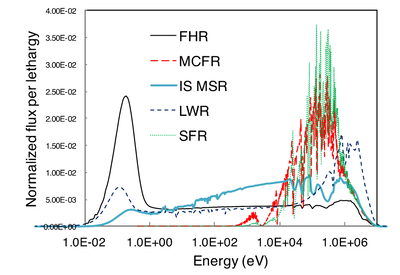TF DOE EPSCOR 2018
Neutron flux from various reactor types
FHR: Nicholas R. Brown et al., "Preconceptual Design of a Fluoride High Temperature Salt-Cooled Engineering Demonstration Reactor: Core Design and Safety Analysis." Annals of Nuclear Energy 103, pp 49-59, 2017.
MCFR: M. Taube and J. Ligou. "Molten Plutonium Chlorides Fast Breeder Reactor Cooled by Molten Uranium Chloride," Annals of Nuclear Science and Engineering, 1.4, pp 277-281, 1974
IS_MSR: N.R.Brown et al., “Sustainable Thorium Nuclear Fuel Cycles: A Comparison of Intermediate and Fast Neutron Spectrum Systems,” Nuclear Engineering and Design, 289, pp 252-265, 2015.
LWR: generic light water reactor SFR: Sodium cooled fast reactor
BNL report from 4/23/18 on Phenomena Important in Modeling and Simulation of Molten Salt Reactors
Media:BNL_Report_4_23_2018.pdf
Quotes from the above report
" A major recommendation of this study is that modeling and simulation of MSRs will require development of computational tool(s) capable of tracking chemical inventories of constituents throughout the primary loop of the reactor facility. Such a tool is not a vital part of water reactor safety analysis since the coolant is a single component (either light or heavy water) with dilute concentrations of other species such as boron or lithium. Thus, an inventory control and evaluation tool is a unique feature necessary for liquid-fuel reactors. (The issue may be relevant to solid-fuel MSRs but was not a consideration in this pre-PIRT.) A comprehensive evaluation of fuel salt composition will likely require the modeling of salt chemistry, thermodynamics, mass transport, and addition and removal of chemical species. Fission and transmutation products will be generated in the salt and will form a variety of chemical species. The phase behavior of these species is complex, and depends on the specific design, particular fuel salt, and plant operation. "
"For fast spectrum chloride salts, there is a need for high flux radiation stability tests to determine if radiolysis effects are significant and to determine the extent and distribution of fission gas products. The radiolysis of the salts could affect the composition of the salts and lead to formation of corrosive gaseous products such as chlorine gas. The rate of radiolysis and recombination is currently not known and needs experimental evaluation."
